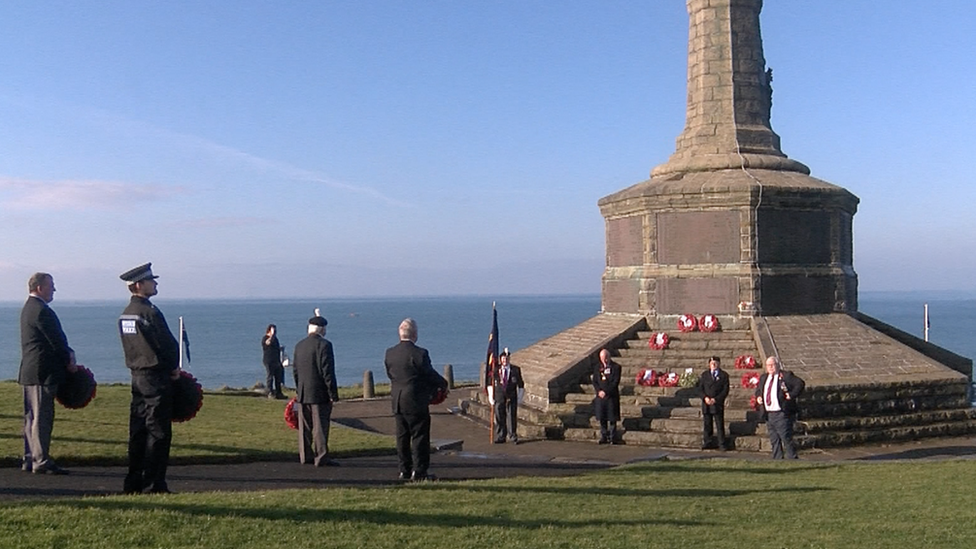Remembrance Sunday: Queen leads scaled-back events
- Published
Socially-distanced events have taken place across the UK, including at the Cenotaph in London
The Queen has led the nation in marking Remembrance Sunday, as people around the UK privately paid their respects at home due to the coronavirus pandemic.
She was joined by family members and the PM at the scaled-back service at the Cenotaph in London's Whitehall.
Social distancing measures were in place and the service was closed off to the public for the first time.
Following a two-minute silence, wreaths were laid by Prince Charles, Prince William and the PM, among others.
The commemorations remember the armed forces community, British and Commonwealth veterans, the allies who fought alongside the UK and the civilian servicemen and women involved in the two world wars and later conflicts.
Normally, Whitehall is packed with thousands of veterans and members of the military for the commemorations, but on Sunday less than 30 veterans were in attendance.
The Queen, dressed in a black hat and coat, looked on from a balcony at the Foreign, Commonwealth and Development Office building, as her son, the Prince of Wales, laid a wreath on her behalf.
Others who took part in the wreath laying included the Duke of Cambridge, the Princess Royal and Earl of Wessex, Prime Minister Boris Johnson and opposition leader Sir Keir Starmer.
Also present at the service were former UK prime ministers Theresa May, David Cameron, Tony Blair and Sir John Major.
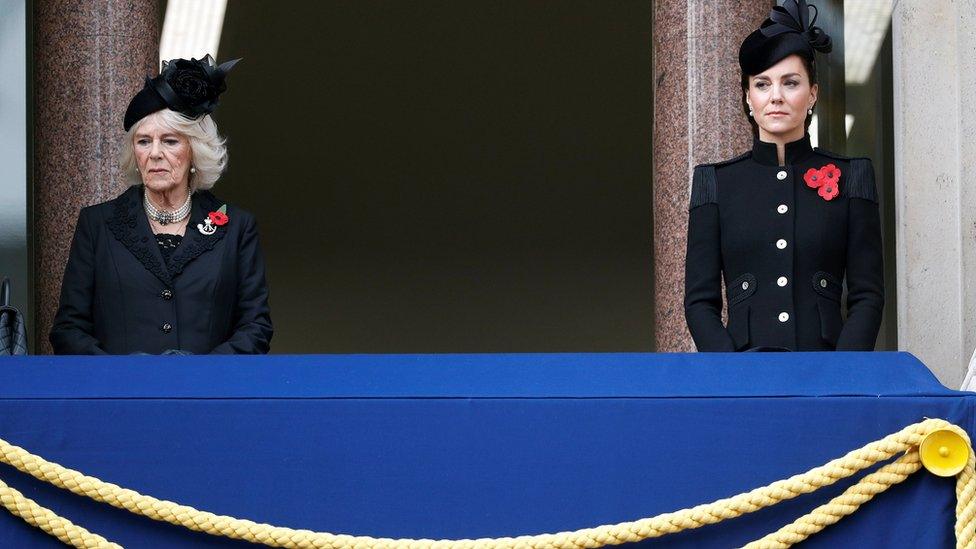
The Duchess of Cornwall and Duchess of Cambridge attended the service
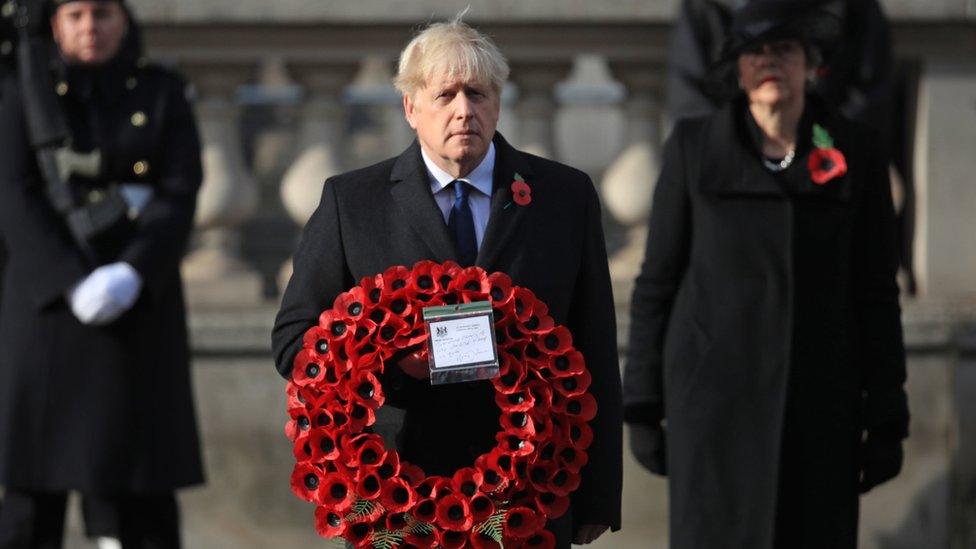
Prime Minister Boris Johnson was joined by former leaders Theresa May, David Cameron, Tony Blair and Sir John Major
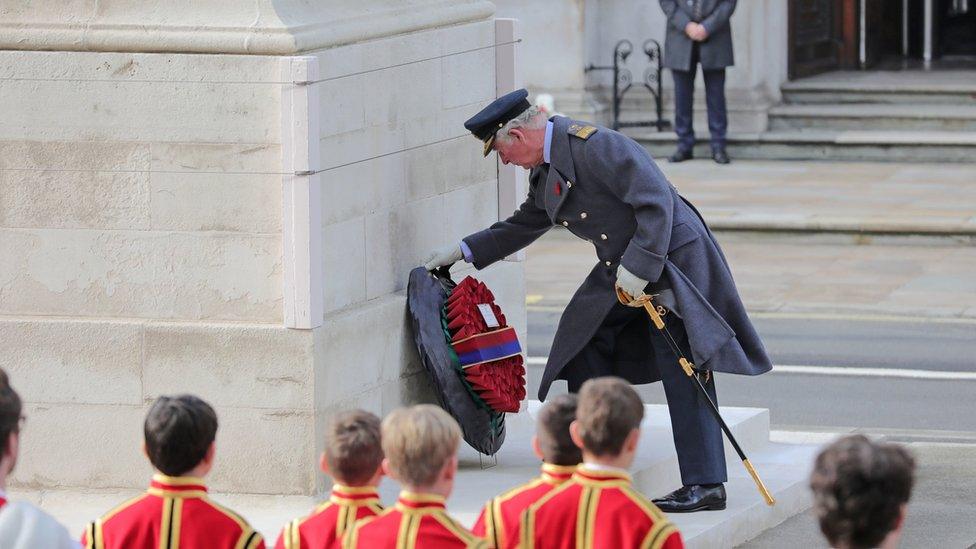
Prince Charles laid a wreath on behalf of the Queen
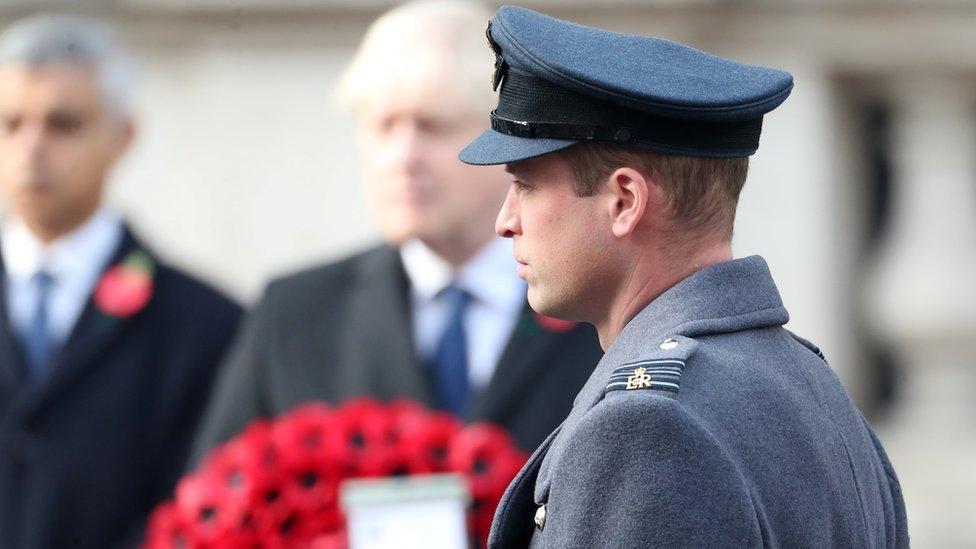
Prince William was also among those who laid a wreath


It felt the same on Whitehall this year, but also really quite different.
At the heart of the ceremony, as ever, was the Cenotaph - the simple stone memorial to the dead of so many conflicts, unveiled a century ago by George V, overlooked on Sunday by the Queen on a Foreign Office balcony.
There was the familiar and always-moving grandeur of the two-minute silence, the wreath laying, the solemn contemplation of so much sacrifice and loss.
But missing were the members of the public who normally travel from all over the country to be here, who stand three or four-deep along the barriers that line either side of Whitehall.
Missing too were the great number of military veterans who march past the Cenotaph after the wreath-laying.
The public and the veterans bring life to this commemoration of loss - they ground this remembrance and make it more personal, more sharply felt.
Remembrance Sunday belongs to those who gave - their lives, their health, their loved ones.
Everyone here in Whitehall will hope that next year will see the public and military veterans return.

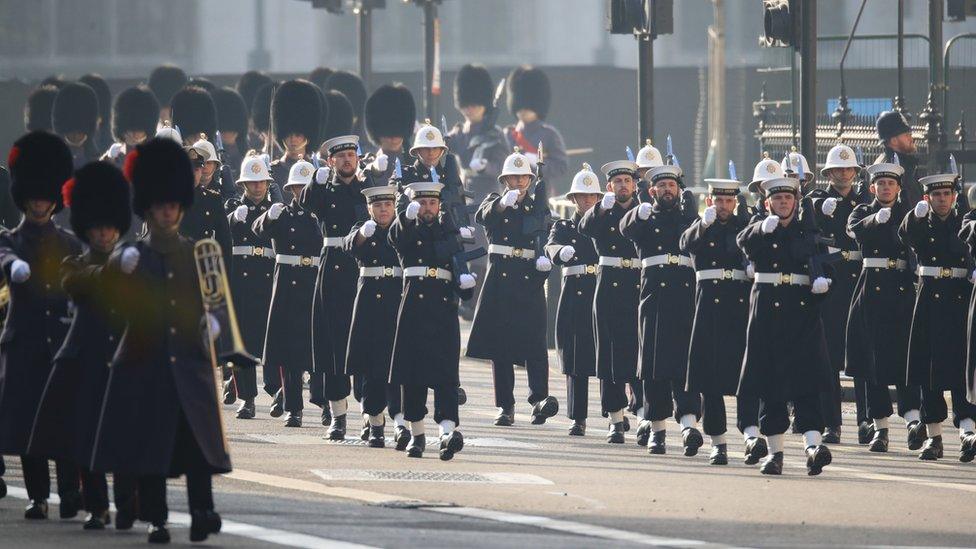
Members of the Royal Navy marched down Whitehall ahead of the Remembrance Sunday service
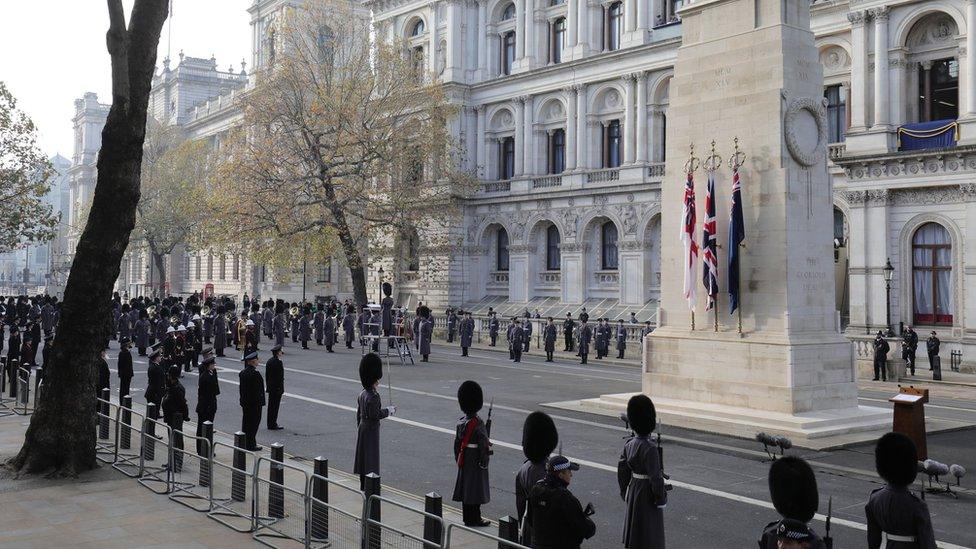
Remembrance Sunday this year 'particularly tough'
The Duke of Sussex, who stepped down as a working member of the Royal Family and now lives in California, was not at the ceremony but spoke about what serving his country means to him.
In a podcast to mark Remembrance Sunday, Harry, who spent 10 years in the armed forces, said: "Being able to wear my uniform, being able to stand up in service of one's country, these are amongst the greatest honours there are in life.
"To me, the uniform is a symbol of something much bigger, it's symbolic of our commitment to protecting our country, as well as protecting our values.
"These values are put in action through service, and service is what happens in the quiet and in the chaos."
General Sir Nick Carter, Chief of the Defence Staff, said some veterans might find Remembrance Sunday a lonely experience this year due to the Covid-19 restrictions.
Sir Nick told the BBC One's Andrew Marr Show the guidelines would be "particularly tough on our veterans", adding: "They traditionally have had the opportunity to get together and talk about their memories and their reflections, but equally to strut their stuff."
Usually, about 10,000 people gather at the Cenotaph in Whitehall for the remembrance service.
But with the event being closed to the public, the Royal British Legion and Legion Scotland advised people to observe the silence in honour of those who lost their lives in conflicts from their doorsteps.
The public was also encouraged to share family histories and messages of remembrance online using the hashtag #WeWillRememberThem.
In Wales, which is also under a national lockdown, outdoor events were permitted up to a maximum of 30 people, although parades were not allowed.
The national service of remembrance in Cardiff was held with a small number of invited guests present,
Traditional annual remembrance events at local war memorials across Scotland were also cancelled, with outdoor standing events not permitted in areas under Covid levels one, two and three. However, thousands of people observed the two-minute silence on their doorsteps.
Restrictions were also in place in Belfast, with members of the public unable to attend the event at City Hall.
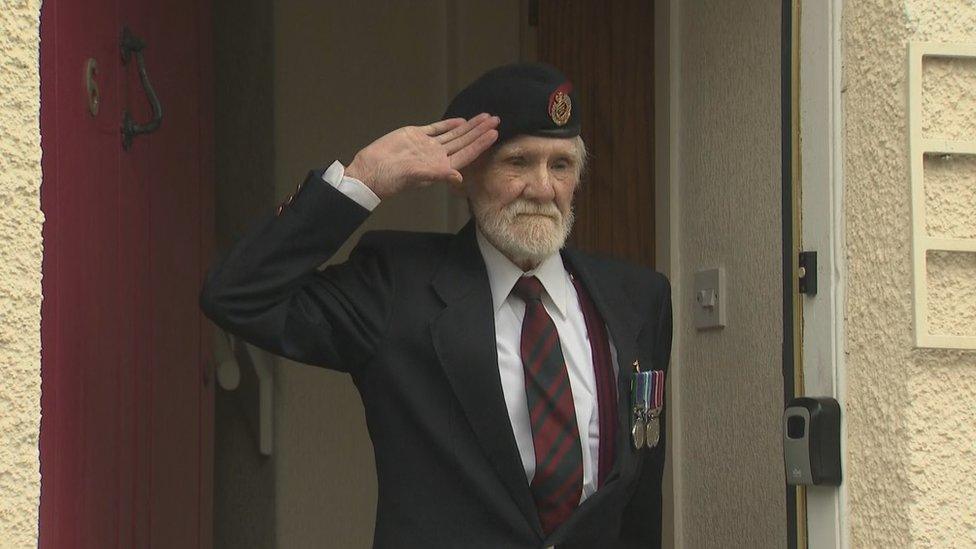
Ex-servicemen were among those who paid tribute to the fallen from their own doorstep in Scotland
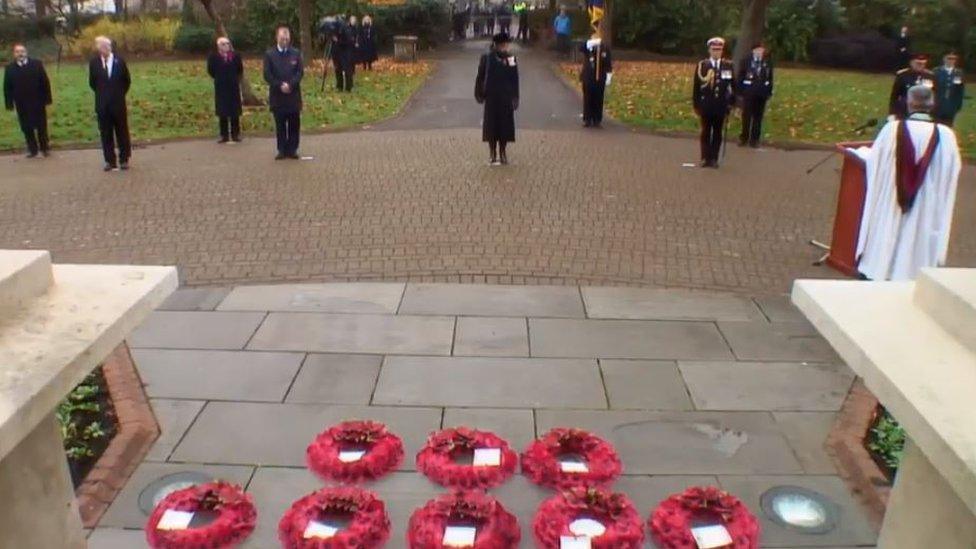
A national service of remembrance was held at the Welsh National War Memorial, Cathays Park, Cardiff
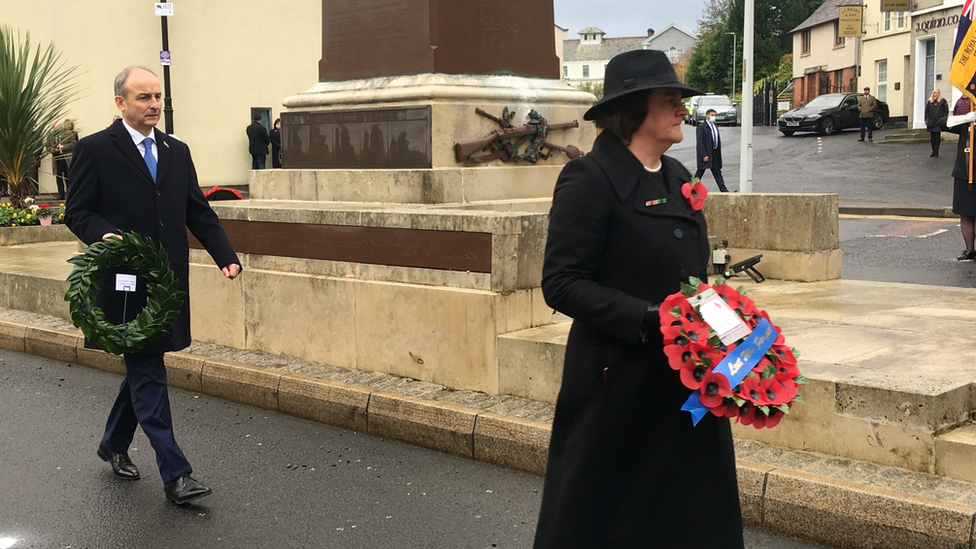
The Irish Republic's Taoiseach (Irish Prime Minister) Micheál Martin and Northern Ireland First Minister Arlene Foster laid wreaths in Enniskillen
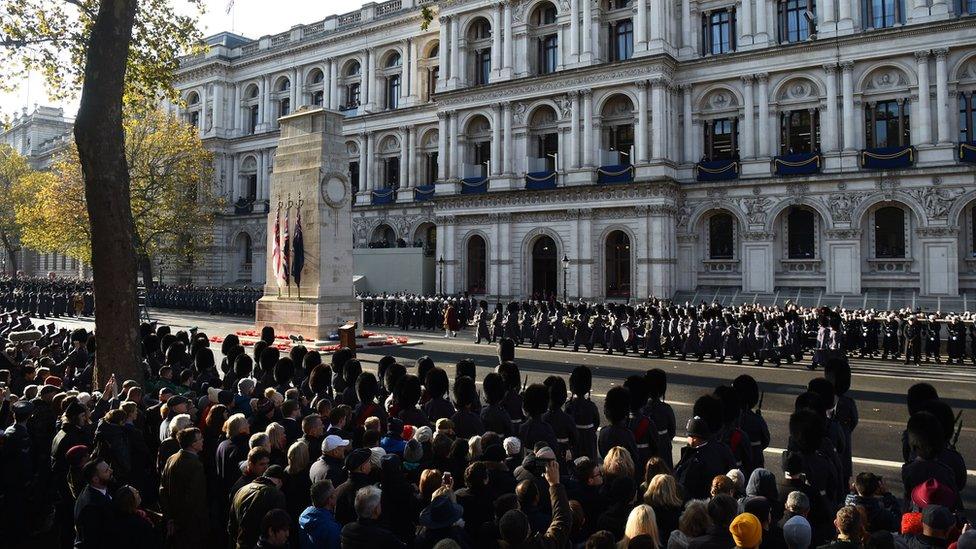
About 10,000 people usually gather for the Remembrance Sunday service at the Cenotaph
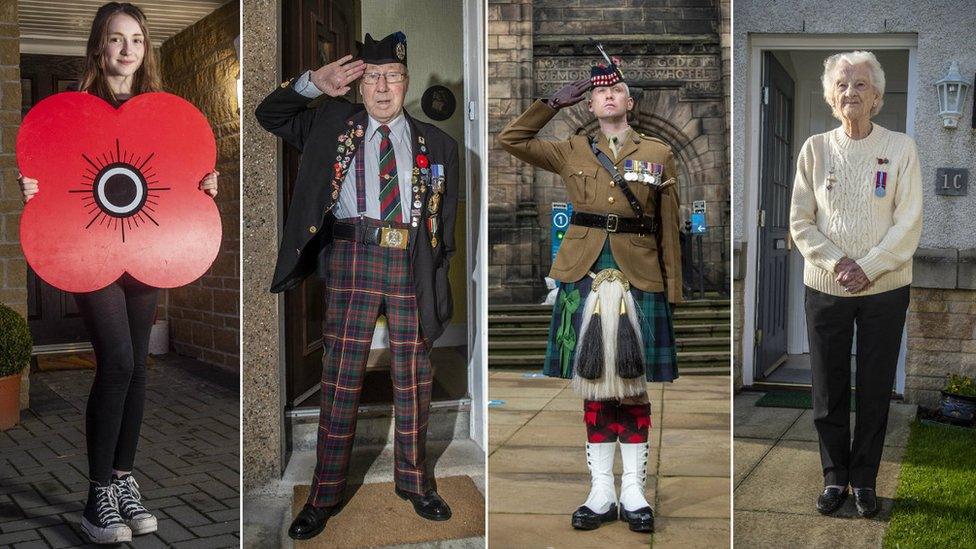
Legion Scotland asked the public to observe the two-minute silence from their doorsteps
It comes after Prince Charles paid tribute to the nation's armed forces for standing "side-by-side" with frontline NHS staff and key workers during the coronavirus pandemic.
Speaking at Saturday's annual Festival of Remembrance at London's Royal Albert Hall, which was pre-recorded and filmed without an audience, the Prince of Wales said the country had endured "anxiety and grief not previously experienced in peacetime".
"In this challenging year, we have perhaps come to realise that the freedoms for which they fought are more precious than we knew, and that the debt we owe them is even greater than we imagined," he said.
On Wednesday at Westminster Abbey, the Queen commemorated the 100th anniversary of the interment of the Unknown Warrior, who represents World War One soldiers whose place of death is not known or whose remains are unidentified.
She was seen wearing a face mask in public for the first time during the visit.
The 94-year-old monarch had requested the private pilgrimage after she was advised not to attend the warrior's centenary service next week. The Prince of Wales and Duchess of Cornwall are expected to join this service on 11 November, Armistice Day.

How will you be marking Remembrance Sunday? You can share your experiences by emailing haveyoursay@bbc.co.uk, external.
Please include a contact number if you are willing to speak to a BBC journalist. You can also get in touch in the following ways:
WhatsApp: +44 7756 165803
Tweet: @BBC_HaveYourSay, external
Please read our terms & conditions and privacy policy
If you are reading this page and can't see the form you will need to visit the mobile version of the BBC website to submit your question or comment or you can email us at HaveYourSay@bbc.co.uk, external. Please include your name, age and location with any submission.
- Published7 November 2020
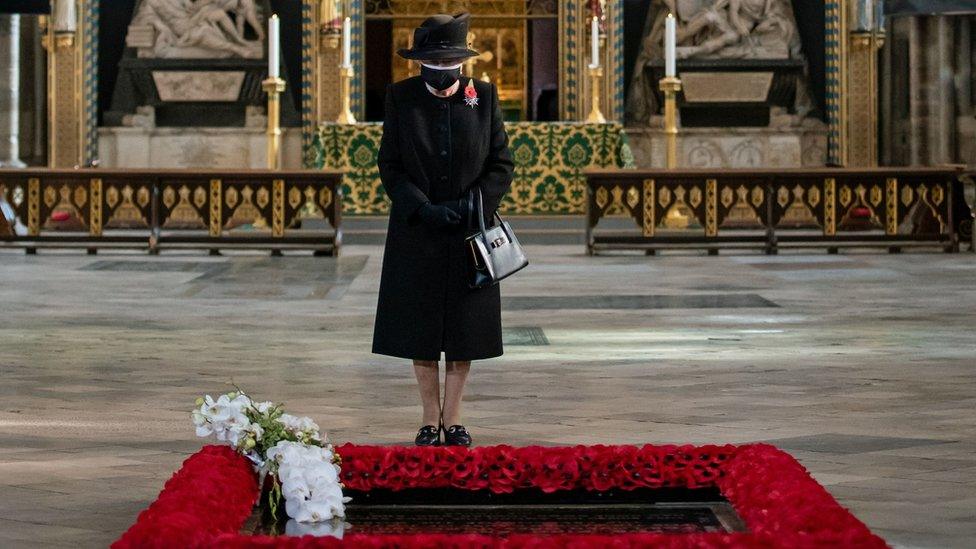
- Published6 November 2020
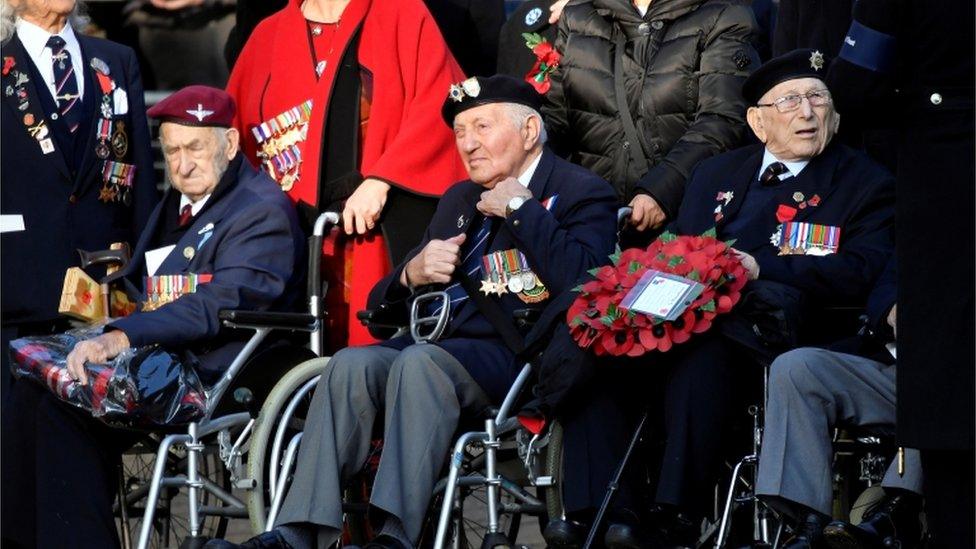
- Published8 November 2020
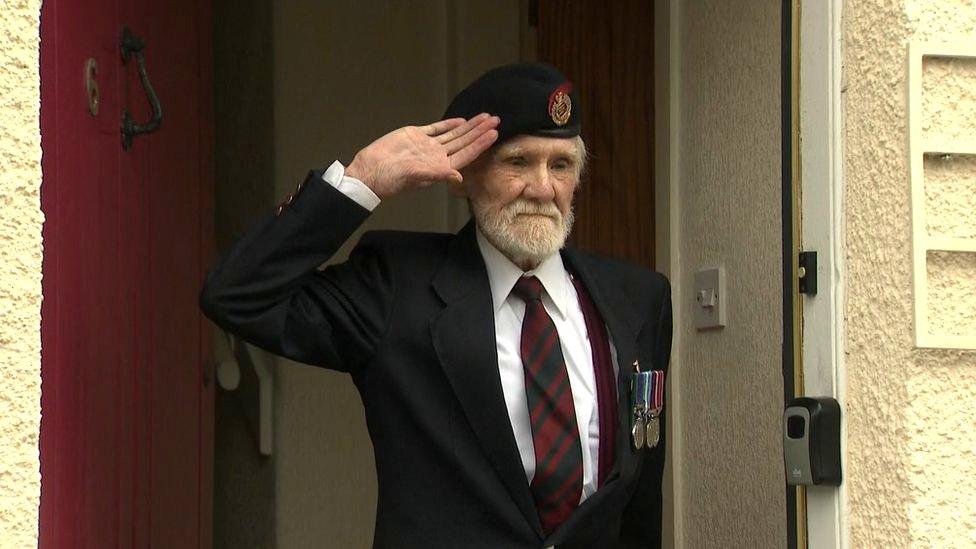
- Published8 November 2020
